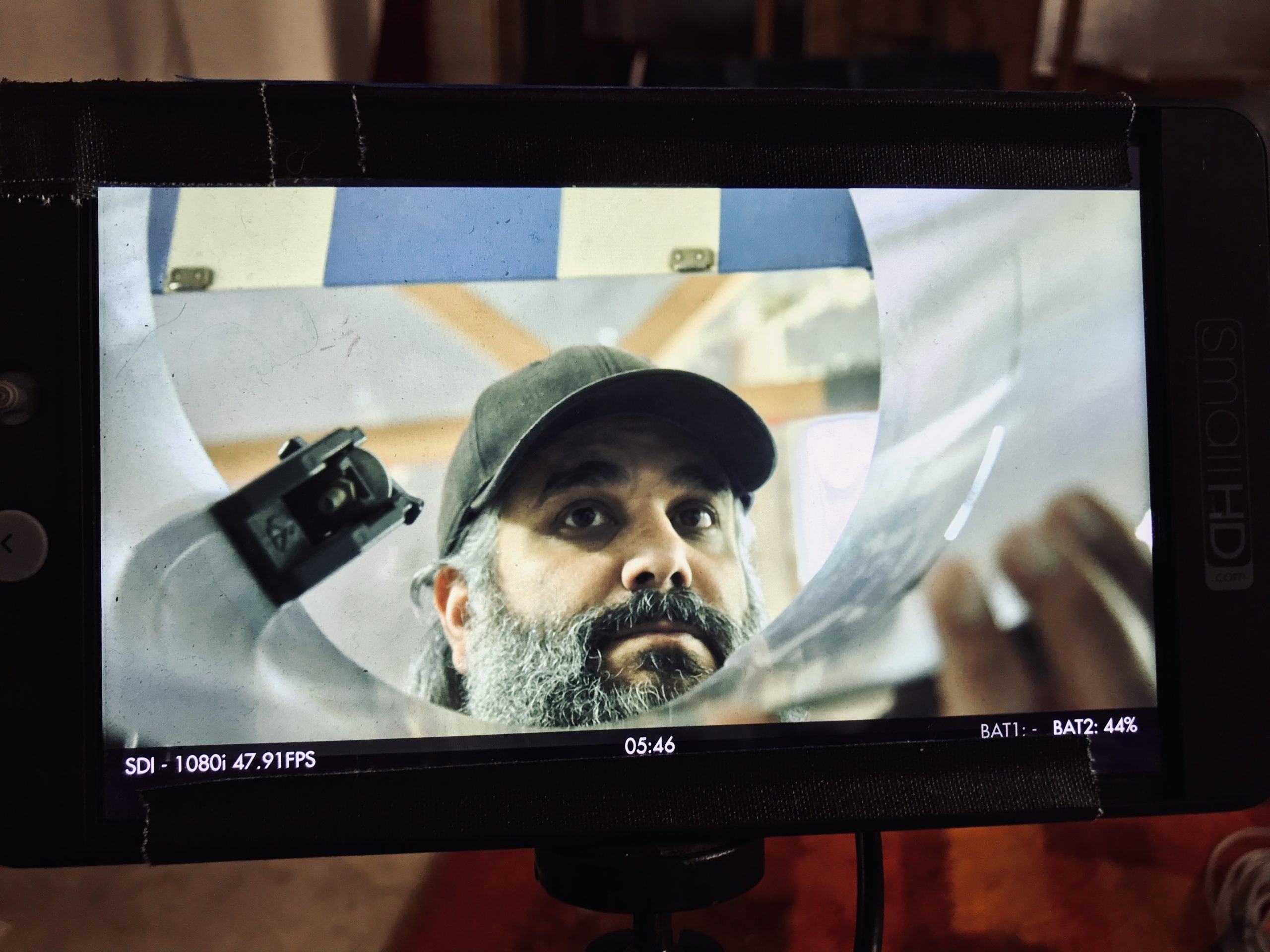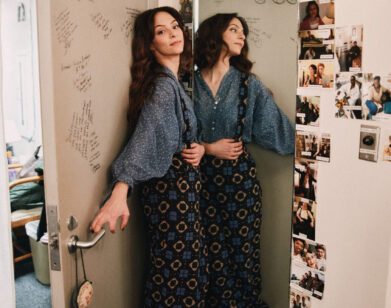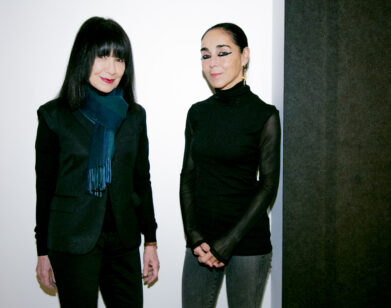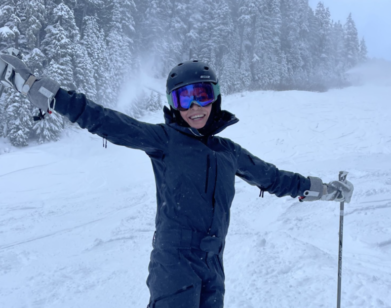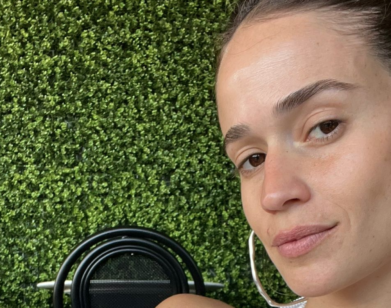REVOLUTION
“What’s Happening in Iran is Not a Local Story”: Meet Filmmaker Mahyad Tousi
At a Tehran birthday party in the early aughts, a woman turned to Mahyad Tousi, then a conflict zone documentarian, and asked him how it felt to have a job contributing to the cesspool of media that exists in the world. It’s a question that haunts him to this day: “Why make anything, really?”—unless it serves a purpose. “If we’re not in the fight, then we’re part of the problem,” he told us earlier this week. From working as an executive producer for the CBS sitcom, United States of Al, to co-founding a production studio to elevate Middle Eastern stories, Tousi tries to keep a purpose in mind. His debut film, Remote, which he created with contemporary artist Mika Rottenberg, inhabits a more experimental framework. It’s a solarpunk fantasy, both familiar and strange, in which a woman discovers an anomaly in the virtual world that sends her on a quest toward a more genuine form of connection. Tousi spoke with us about growing up during a revolution, why more people should be paying attention to the current movement in Iran, and why the film had to be about six women.
———
MAHYAD TOUSI: Good to meet you.
SASHA VON OLDERSHAUSEN: Good to meet you, Mahyad.
TOUSI: Where are you?
VON OLDERSHAUSEN: I’m in New York, in Queens. How about you, where are you?
TOUSI: I’m in Los Angeles, in Laurel Canyon.
VON OLDERSHAUSEN: Is that where you’re based?
TOUSI: For the last few years, post-Covid. But I have a place in Brooklyn, which is where I’ve been for… God. I’ve been in New York since 1994. The longest stretch of time I’ve been anywhere is in New York. And then before that I was in Miami and then D.C., and Iran.
VON OLDERSHAUSEN: When were you in Iran?
TOUSI: I was in Iran until I was 13. But I was born in Portland, Oregon. My mom was having a difficult pregnancy so she came here, stayed in the hospital, had me, and we went back. I was pretty much in Iran until 1986. So I was there during the revolution, I was there for a good part of the war. When they were doing one missile a day into Tehran, I was still there, and then I came here. I went back between ‘98 and 2008 and really got my hands dirty in the whole 2009 thing and then didn’t go back after that.
VON OLDERSHAUSEN: That seems to be a pretty common narrative for a lot of people. Where in Tehran were you?
TOUSI: Vanak. So you’re half-Iranian?
VON OLDERSHAUSEN: Yeah, I’m half. My mom grew up in Tehran and she has a little apartment in Pasdaran. I spent a year living there in 2011. I also went back and forth growing up to visit family because I have a lot of family still there. But I haven’t been back since 2016. I just haven’t felt comfortable as a journalist going back there. So, I wanted to talk to you about what’s going on in Iran, obviously, but I also want to spend some time talking about your latest work. Where should we start?
TOUSI: We can spend all day talking about Iran.
VON OLDERSHAUSEN: Totally. I’ve noticed you’ve been quite vocal on Twitter. Is that where you get your news of what’s happening?
TOUSI: If you recall in 2009, Twitter was just a place where you posted your status about what you were doing. It wasn’t really until a couple of political events happened—and then it really blew up with Iran—that Twitter became a news gathering entity. I remember I was flying from New York to San Francisco when the 2009 [Green Movement] happened. I landed in San Francisco and my phone was blowing up with things like, “They’re killing people.” I’d spent a few years working as a conflict-zone videographer and cinematographer so I had met journalists who had worked on the ground and I also met activists. And those connections suddenly became the way of news getting out. People were sending me information that felt like desperate calls for help. At that time, I basically lived on a couch and all I was doing was triage between news that was coming out of Iran for major news organizations. It didn’t stop for months trying to do that triage work and spreading information.
VON OLDERSHAUSEN: You said you got your hands dirty in 2009?
TOUSI: We started to try to identify bad actors inside of Iran. We tried to organize hackers and those kinds of things and tried to get information out that would be helpful and useful to people, organizing call centers who were calling family members of bad actors inside of Iran and saying, “Look, here’s what your husband is doing. Here’s what your son is doing.”
VON OLDERSHAUSEN: And you were doing that from here?
TOUSI: Yeah, the hackers were all over the world. They were not Iranian. They were connecting hackers to each other. It was just about being a node between various actors who were motivated by that situation.
VON OLDERSHAUSEN: So then after 2009, did you claim asylum in the States?
TOUSI: No, I was born here so I’m one of the lucky ones. I never had to deal with immigration. I was an immigrant with a U.S. passport.
VON OLDERSHAUSEN: Oh that’s right. Do you have an Iranian passport as well?
TOUSI: I do. I have an old one but I do.
VON OLDERSHAUSEN: One of the things I’ve been thinking about a lot is just how visually generative this current movement has been, in terms of the images that have been coming in of women cutting their hair, burning their hijabs, the young schoolgirls who have their backs facing us who are flipping the bird at the portrait of Khamenei that hangs above their classroom. As someone who works in the visual arts, what do you make of all this imagery?
TOUSI: It’s extraordinary. It is almost overwhelming. I try to put myself in the mindset of someone who does not know this place or this culture, or does not know the issues and what’s at stake and what’s actually happening and this barrage of symbolism and visual metaphors coming at them—it’s really difficult. The thing I’ve been harping on about is, what’s happening in Iran and with Iranian women is not a local story, it’s a global one. Iranian women specifically are leading the fight for liberalism and democracy globally. They’re at the frontlines of that war, at a time when democracy has never been less popular.
VON OLDERSHAUSEN: I’ve been so surprised that, particularly at this moment in America, given everything that happened with the overturning with Roe v. Wade, more American women haven’t been rallying behind this movement in Iran because it’s the same throughline. It’s about autonomy over one’s own body, the freedom to choose.
TOUSI: I mean there’s a gap of understanding. There’s a lack of understanding between what’s going on in Iran and what’s happening in this country. It’s like, “Okay this seems similar but they’re so far away from me in terms of the ideas and philosophy and issues that they’re dealing with that this can’t be relevant.”
VON OLDERSHAUSEN: I’m curious how your personal experience impacted your own work. Thinking about your film, Remote, there’s obviously this familiar pandemic-esque desire for connection, but it’s also easy for me to project that theme as being tied into the exile narrative.
TOUSI: I don’t think we were necessarily thinking about exile narratives, but the reality was that both Mika and I are transplants. She’s Israeli, I’m Iranian and we grew up in different places. She was born in Argentina, I was born in the U.S. We both grew up for a short period of time in the place we’re from, and then spent most of our time here in the U.S. I think that way of being, that way of seeing the world and moving through the world as a person who is of multiple places but who is of no place—all of these things are in our DNA.
We started the conversation around this film right at the start of the pandemic. We went into lockdown, we started talking about it as it was unfolding and then the whole George Floyd thing happened. It wasn’t just that we had a pandemic and that was in one box and other things happened in silos. I think the fact that we were in a pandemic and lockdowns affected the way we responded to George Floyd, for instance, and it affected our politics and it affected the elections. It affected how we rendered the narratives that were already so poisonous and toxic in this culture. So for us, this was a potential for catharsis, a way of distraction. We wanted to land on a more hopeful and optimistic place. We felt it was really important to do at this time. We needed it for ourselves, we needed it for our kids.
VON OLDERSHAUSEN: Right.
TOUSI: And then the other part of it was, you know, what’s the throughline for me? I went to first grade in the middle of the revolution, and my nine year old was in first grade in 2020. And so his first grade got interrupted by the pandemic; my first grade got interrupted by the revolution. My mom was an elementary school teacher so we went to the same school and one day we were driving to school and my mom took a turn and somebody hit her in the side. It was my mom’s fault. I was sitting in the passenger’s seat and my head slammed into the passenger window. I remember I was a little dazed and my mom was like, “Are you okay?” My mom is a matriarch, she’s a lioness. My vision of an Iranian woman is this powerful, uncompromising lioness. She was the strongest person I knew. And I remember the guy came out and walked around the car and came to the front and my mom came out and walked to the front. So they converge right in front of the windshield in front of me, and the guy slapped my mom in the face. I remember that moment, it was sort of like when the Islamic Republic landed on me, you know.
VON OLDERSHAUSEN: Wow. He just slapped her?
TOUSI: Yeah, and I had seen all kinds of crazy shit during the revolution, you know, like kids holding kalashnikovs but none of those things measure up to this moment where this man just arbitrarily slapped my mom. Like here it is. Here’s the patriarchy. You’re a woman. Shut the fuck up. I could see this tension, like these malevolent forces that exist within male culture. It was almost like there was a break in the matrix. I could suddenly see these forces of energy visually in front of me. And that changed a lot for me.
The connection between that and this film is that for me. This film was very much about these women and about this moment of transformation. It’s a very silly movie in some ways, a very simple plot. It’s not trying to do anything extraordinary, but it is something magical. I could not imagine this plot or this narrative or this story working if one of them was a guy. I just couldn’t see it. It would have changed the story entirely. It had to be women.
VON OLDERSHAUSEN: It’s interesting because in watching this film, I didn’t even really register at any point that it was all women—maybe because it was just intuitive in that way.
TOUSI: That’s a dream to hear because what you want is for your footprints to disappear.
VON OLDERSHAUSEN: There was so much that was familiar to me in watching the film. As I was sitting down to watch it, I’d made my sad little dinner for one, and sat down watching this woman eating her sad dinner for one, and it was like I was living through her but watching her at the same time.
TOUSI: This is the weird thing about our film is that it comes out of a shared experience of the pandemic and the last messed up two years of everything else that’s been happening in the world with information and misinformation and social media and what social media does and can do, how it connects us but also is a way of torturing us and making us self-conscious and how we’re all puppets of our own existence and puppet masters of our own psyche. All of these things are familiar so you can watch it and be like, “Ah, I get it.” It’s a very different way of looking at a film. It’s been so wonderful talking to people because of how authoritative they feel in talking about it and connecting with it and connecting themselves to it because it is connected and you get it and that’s lovely.
VON OLDERSHAUSEN: Yeah, and there were things that felt so grounded in that pandemic moment, and then there were things that felt like they were pushing into the realm of sci-fi. I really loved all the gadgets. It reminded me of the “Fifth Element” at moments, like her home garden where she’s literally harvesting potatoes in her apartment, or the food packaging that was part of the meal itself, like the instant soup that she got that dissolves into the soup.
TOUSI: We love the solarpunk aesthetic. Both aesthetically, from a design perspective, and narratively. So we knew we wanted this future to be a solarpunk future. You know, she’s got the herbs she puts over her omelet at the beginning while drones are trafficking outside her window. And that she can harvest her own vegetables to make food and then the packaging — I mean it’s easy to write; it was amazing that they could build it.
VON OLDERSHAUSEN: What did they make the packaging out of?
TOUSI: Rice paper. Amazing, right? The other component of this solarpunk aesthetic is that there are old things. I think there’s this tendency to want to make the future look futuristic where everything is unfamiliar. But she has a GE fan and it’s like the way we live now. We understand waste is not good so how do you actually reincorporate the old things? So it was all about thinking about all those things.
VON OLDERSHAUSEN: There’s a retro element to the imagined future which makes it feel, like, really tactile and satisfying.
TOUSI: Luckily, Mika and I had worked together before and I had shot as a cinematographer her previous works, and so we had this common visual language. And I love Mika’s aesthetic. I love the way that Mika’s mind works and so to be able to build this subtle narrative within that lush world of Mika’s mind was an unbelievable privilege and an amazing opportunity. We were so in line in terms of all of these little nuanced decisions around the gadgets but also the things that make up one’s life, the environment. It was really exciting. It was a good way to get through these crazy last two years.
VON OLDERSHAUSEN: Yeah I bet. I’m curious, why the decision to have the protagonist in Kuala Lumpur?
TOUSI: Yeah, so going back to your initial question about exile and that experience of being—that Mika and I are transplant immigrants, who are in somewhat of an exile from our homelands and this notion of a future being a future movement where people aren’t where they’re supposed to be. Like the amazing Pooya Mohseni, who plays an Iranian woman in the film. She’s a trans woman who’s in Tehran. It’s the same thing—she wouldn’t be in Tehran at the moment but in this future, she is in Tehran.
VON OLDERSHAUSEN: Oh, but I thought the Islamic Regime has actually acknowledged trans people.
TOUSI: I mean, yes—the reality is that there was a plea made to Khomeini and he issued a fatwa but stripped of any queerness. The notion of being of trans but not queer is a queer notion. I don’t think trans people in Iran live a healthy, normal, safe life. I think they’re under an incredible amount of pressure from their families, from society. You know, in these big monumental movements in Iran, you don’t think, like, what’s happening with the queer community? What’s happening to those people? Just like the horrible things we were seeing around George Floyd around the trans community and the queer community. So I think it’s a bit more complicated.
VON OLDERSHAUSEN: Absolutely. I just remembered that documentary from 2008, Be Like Others, about how people within the LGBTQ community in Iran felt almost pressured to identify as trans because that’s the only way they could live free of harassment. And I remember reading about how the gender confirmation surgery industry had really blown up in Iran.
TOUSI: I remember there was a time in the 90s that people would go to have these procedures in Iran because it was a place you could go to have them and it was cheaper. It’s also a very homoerotic place, if you will. You know, men are a lot more touchy-feely. But hiding is the problem. If you’re hiding from your identity and you have to hide from everyone, then you’re eating at your own soul. That’s the injustice that no one deserves.

